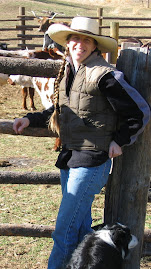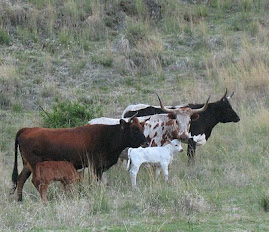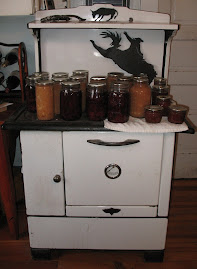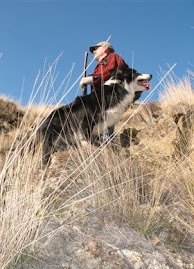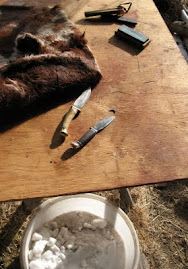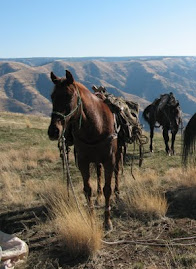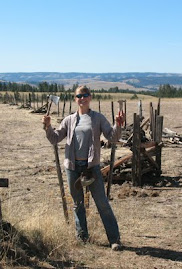This morning just before dawn, when I woke up and could feel
cold seeping into the old farmhouse, I thought of the garden, ripening and
vulnerable. The cucumbers and beans are coming on strong, but the winter squash
has a long ways to go. An overnight forecast of 41 degrees in Joseph could easily be 31
degrees here where the air currents flow down-valley along the creek.
 |
| Yearlings mid June |
The last two nights I covered the garden with huge tarps and it had frosted hard. But I didn’t want to go out in the dark and cold last night, and now my conscience was nagging me. I went to the kitchen and looked at the outdoor thermometer, 36 degrees. Whew. This cold snap would not be the one to put an end to the warm weather crops. There was still hope of a few winter squashes to squirrel away for the months ahead.
 |
| First cuke harvest |
I have not gleaned or put-up as much food this year as I
usually do. The drought and other challenges have put extra demands on our bodies
and our waking hours outside our day-jobs of community development and
rangeland management. Dealing with dwindling irrigation water, early moves to
pastures, fences needing many repairs, hustling to get catch pens up in
pastures without
corrals or reinforcing old corrals.
 |
| New full crib |
 |
| Cows and calves, August pasture move earlier than usual |
This morning, even though there is no wind, I find myself thinking of winnowing. The act of separation, the ways we choose what to keep and what to discard, what is desirable and what is unwanted.
 |
| August bouquet |
In June my friend Beth passed away and I wanted to make something special and delicious for her memorial. She was a skilled farmer and used her organic produce and other locally-sourced food in her catering business, with beautiful and yummy results.
Beth was also my partner in last minute trips to pick fruit in wild places. We borrowed each other’s ice cream freezers when we needed to make multiple gallons of ice cream to feed large gatherings. We schemed and planned community food system projects, like starting a farmers market and a local food directory, or a grow-a-row for the food pantry campaign.

Maggie one year old, 'I'll herd em! Cats, cows, horses!'
When I decided to make beef cheeks for the potluck, I did something
I rarely do, I followed a recipe and I cooked with wine. After a 90 degree day,
I stayed up so I could use the oven at night, braising the beef cheeks on a
bed of vegetables for three hours, then putting the pot in a bath of cold
water to so I could go to bed.
 |
| Bunkhouse, August morning Wallowa Valley |
The next day, I saw the recipe said to remove the meat and put the vegetables and braising liquid through a sieve. I have a sieve, but I've hardly ever used it and I almost skipped this step. What difference would it make? But I went ahead and fished out the chunks of meat and heated up the gelatinous stock to make it pourable.
 |
| Sedona, Zumwalt Prairie |
Back and forth, back and forth, I pressed the wooden spoon
against the mesh until nothing more seemed to go through. Not much was left in
the sieve and it looked totally edible to me. I was tempted to scrape it into
the pot, but I didn’t.
The recipe then said to slice the beef cheeks and put them back into the sieved liquid and reheat. I’ve never done that before either. I’ve just cooked them until done and served them. But I did it, hurrying to get it all really hot before packing the big pot in towels in a box and rushing off to the potluck.

Squash, cuke, bean patch, not yet frosted!
As I placed the pot on the table, I was given a little card
to label my dish, “Beef cheeks braised in red wine, Magpie Ranch.” I thought a
lot of people might avoid eating a beef cheek, something they had never probably
never heard of or tasted before.
 |
| New hollyhock, from seed collected in an alley |
I was a bit overwhelmed by the gathering, even though it was
outdoors and everyone was well spread out under the pine trees beneath the
shadow of Mount Joseph. I lingered on the edges, thinking of Beth and feeling
her loss, but after the eating began, people started coming up to me. “Somebody
told me you made that dish, those beef cheeks. Those are incredible!” I said
thank you, and figured I better go try some myself. They were different from any other meat I've had. Hot, savory, and satiny, they literally melted in my mouth.

Transparent apples, early to ripen, good for sauce
I don’t really know what this means, but since the potluck I’ve used my sieve a few more times, discarding parts of what I’m canning, blackberry seeds, plum skins. And each time I’ve felt an oddness about this winnowing, this choice to discard something that could be eaten, that is probably good for you. And it makes me think of other kinds of winnowing, of the labels we put on people, sorting them into keepers and culls, and of who does the deciding and how and why. Which farmers or ranchers qualify for drought relief funds? Which small businesses should get financial support? Which changes should we seek in the world? Who deserves water, a home, nutritious food, a ventilator, love?
And I know I’m sometimes like the wind, sifting through the
days and moments of my life, choosing, sometimes recklessly, what is precious
and what is undeserving of further thought.
From Sara at Magpie Ranch, home of Bunchgrass Beef





